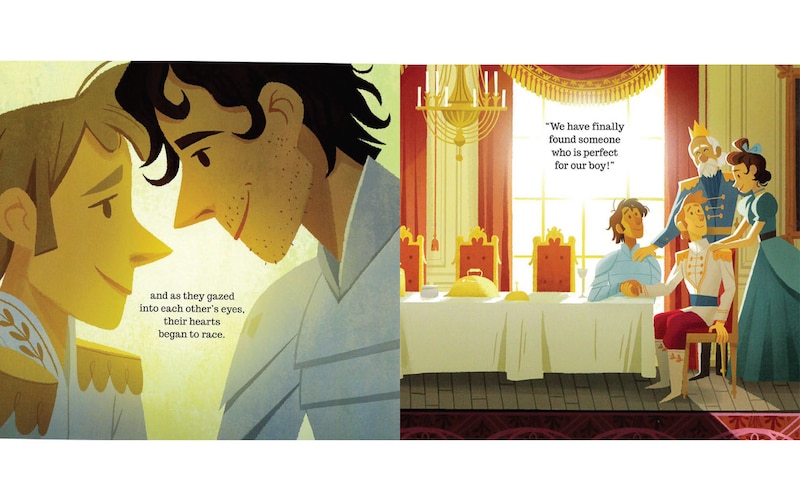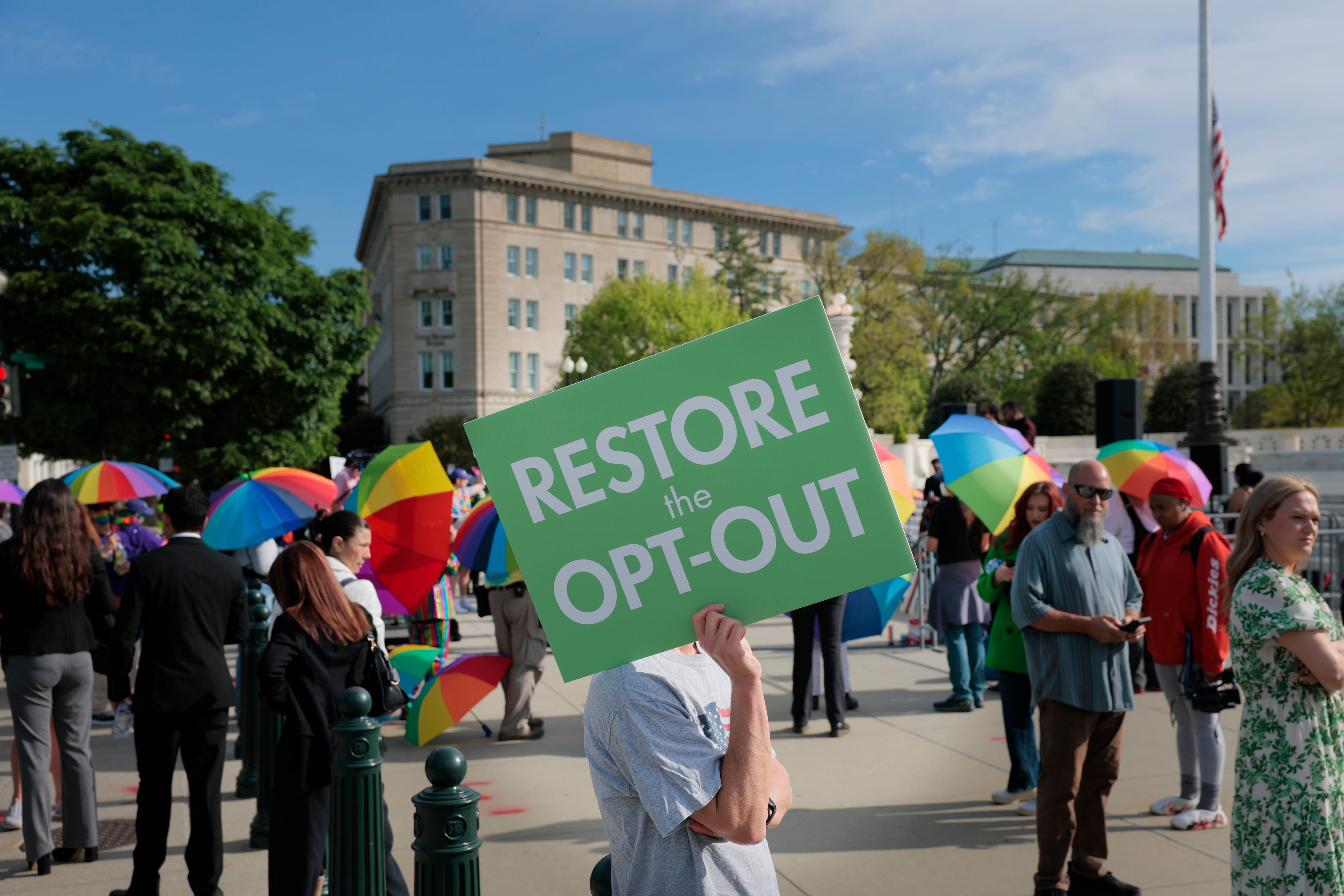Sign up for Chalkbeat’s free weekly newsletter to keep up with how education is changing across the U.S.
Parents in Montgomery County, Maryland, have the right to opt their children out of lessons involving a set of books featuring LGBTQ characters and themes if the materials do not align with the families’ religious beliefs, the Supreme Court decided Friday.
The 6-3 decision in Mahmoud v. Taylor represents a win for the burgeoning parental rights movement, religious liberty advocates, and the Trump administration, which appeared before the high court to lend support to the parents’ case.
The Supreme Court ruled that the parents, who came from Muslim, Roman Catholic, and other Christian backgrounds, would likely be able to prove these books presented a burden on their faith and they should be allowed to opt out of the books while a federal appeals court continues to review their case. Previously, the school district had told the parents that its policy did not allow for opt-outs.
“The Board’s introduction of the ‘LGBTQ+-inclusive’ storybooks, combined with its decision to withhold notice to parents and to forbid opt outs, substantially interferes with the religious development of petitioners’ children and imposes the kind of burden on religious exercise that Yoder [an earlier Supreme Court ruling] found unacceptable,” Justice Samuel Alito wrote on behalf of the majority. “The books are unmistakably normative. They are designed to present certain values and beliefs as things to be celebrated, and certain contrary values and beliefs as things to be rejected.”

“Many Americans, like the parents in this case, believe that biological sex reflects divine creation, that sex and gender are inseparable, and that children should be encouraged to accept their sex and to live accordingly,” Alito continued. “The storybooks, however, suggest that it is hurtful, and perhaps even hateful, to hold the view that gender is inextricably bound with biological sex.”
In a dissent joined by the two other liberal justices, Justice Sonia Sotomayor said the ruling threatened the role public schools play in teaching children of all faiths and backgrounds how to coexist in a multicultural society.
“That experience is critical to our Nation’s civic vitality,” Sotomayor wrote. “Yet it will become a mere memory if children must be insulated from exposure to ideas and concepts that may conflict with their parents’ religious beliefs.”
Advocates for inclusive curriculum and LGBTQ youth worry the ruling will lay the groundwork for parents across the country to opt their children out of any instruction that they say conflicts with their religious teachings.
That could require teachers to spend more time notifying parents about what they’re teaching, devising alternative assignments, finding space and supervision for children who opt out, and catching kids up if they miss other content during an opt-out.
Lawyers and scholars in the parents’ camp have said they do not think giving religious parents the right to opt their children out of lessons will dramatically change public education.
Most states allow kids to skip lessons related to sex education or human sexuality, while Texas already permits parents to opt their children out of any lesson for religious or moral reasons.
And a recent survey from the Pew Research Center found that nearly half of K-12 teachers support parents’ rights to opt their children out of learning about sexual orientation and gender identity at school — suggesting they wouldn’t be averse to working with families to accommodate such requests.
Education Secretary Linda McMahon applauded the ruling on social media. Eric Baxter, a senior counsel at the Becket Fund for Religious Liberty who represented the parents in this case, said in a written statement that the ruling represented “a historic victory for parental rights in Maryland and across America” and “made clear that parents — not government — have the final say in how their children are raised.”
Montgomery County school officials and board members said in a joint statement that while the decision was not what they hoped for, they would determine next steps and “navigate this moment with integrity and purpose — guided, as always, by our shared values of learning, relationships, respect, excellence, and equity.”
Critics have said this ruling could open the door for many more opt-outs on religious grounds. During oral arguments, several liberal justices pointed out that parents have asked to opt out of all kinds of lessons for religious reasons over the last 40 years. That includes portrayals of supernatural topics like wizards and magic and world history and current events that parents viewed as unflattering to their religion.
Some worry schools would ditch certain content and lessons altogether to reduce the likelihood of opt-out requests — a move that would deliver yet another blow to efforts to make curriculum more inclusive.
Teachers might also decide to make LGBTQ-inclusive material optional, said Stacie Brensilver Berman, a clinical assistant professor at New York University who has written about teaching LGBTQ history and has helped teachers introduce potentially controversial topics in the classroom.
For example, teachers might decide to keep books with LGBTQ characters and themes on their classroom shelves, but forgo using those books in classroom read-alouds. Or they may recommend the books “to a student they know has queer parents or a student they know has relatives or friends who are trans and nonbinary, but not make it part of the curriculum,” she said.
Tiferet Ani, a former Montgomery County Public Schools teacher who sits on the board of History UnErased, a national provider of LGBTQ-inclusive history curriculum, worries that widespread religious opt-outs could send students the message that LGBTQ identities are taboo and further stigmatize students who identify with the content their classmates are skipping.
Mahmoud v. Taylor stems from a challenge raised by several religious parents in Maryland’s Montgomery County Public Schools after the district added books with LGBTQ characters and themes to its elementary school English curriculum in 2022.
Among the additions were a book called “Prince & Knight,” which tells the story of two men who fall in love after they battle a dragon together, and “Love, Violet,” a story about a young girl who worries her same-sex crush won’t like the valentine she made her.
At first, the school district — one of the largest in the country and known for its racial, ethnic, and religious diversity — permitted parents to opt their children out of lessons related to the books. But eventually school officials said they’d received too many opt-out requests and would no longer grant them.
Many parents protested the decision and some sued, arguing that the books’ messages about sexuality and gender identity were at odds with their religious beliefs.
While the parents’ lawsuit continues, Montgomery County Public Schools must notify parents if one of the LGBTQ-inclusive books, or any similar books, are to be used “in any way,” the Supreme Court ruling notes, and parents must be allowed to excuse their kids from that instruction.
National reporting intern Norah Rami contributed reporting.
Kalyn Belsha is a senior national education reporter based in Chicago. Contact her at kbelsha@chalkbeat.org.






